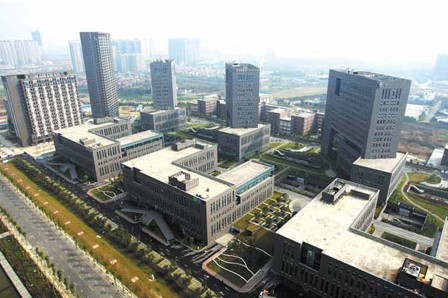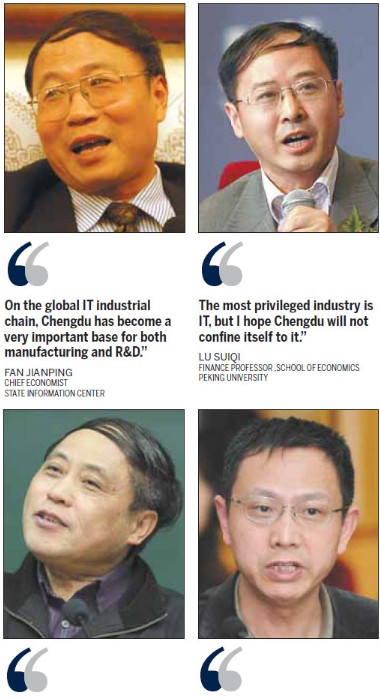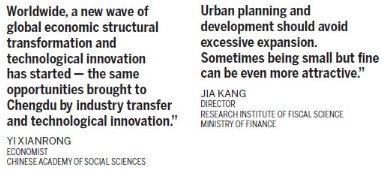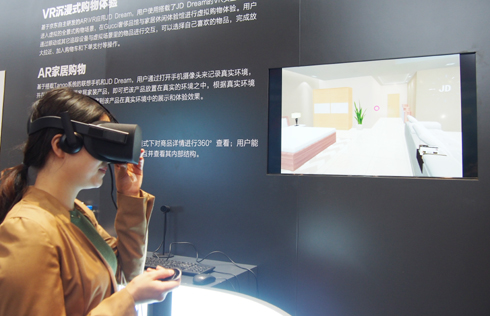

 |
|
The Tianfu New Zone software industrial park is among the many high-tech operations in Chengdu. Provided to China Daily |


Smaller, more space for farms, education, elderly
China's fastest-growing inland city Chengdu will host the largest Fortune Global Forum ever in June with representatives from 442 of the magazine's Global 500 companies slated to attend, according to local media reports.
Against the backdrop of a sluggish world economy, many coastal cities have been severely challenged by falling exports and rising labor costs.
But Chengdu's advantages in geography, industrial structure and urban planning have helped boost exports and the inflow of foreign capital, talent and big international companies, said a leading Chinese expert.
"Last year, the actual use of foreign capital flowing into China decreased by 3.7 percent but it rose 31.1 percent in Chengdu," said Fan Jianping, chief economist at the State Information Center, a government think tank.
Fan said the "Chengdu phenomenon" is mainly driven by IT products that dominated its 32.4 percent growth in exports last year.
"Modernization of the city's industrial structure is very obvious. On the global IT industrial chain, Chengdu has become a very important base for both manufacturing and R&D," he noted.
Over the last 10 years, Chengdu has risen to be the fourth center for IT products following the Yangtze and Pearl River deltas and the Bohai Economic Rim.
Industrial transfer
As well, the city's geographical advantage has brought benefits at the same time coastal areas are challenged by soaring costs. Manufacturers are seeking opportunities in inland cities, which provides a big chance for Chengdu, said Yi Xianrong, an economist and former researcher at the Chinese Academy of Social Sciences.
"The trend is coastal producers moving some manufacturing industries to Central and West China, which soon will become new growth points for the nation's economy," he says.
Some of those migrating businesses enable Chengdu to compete with developed cities worldwide in cutting-edge technology and emerging industries, said Yi.
"Worldwide, a new wave of global economic structural transformation and technological innovation has started - the same opportunities brought to Chengdu by industry transfer and technological innovation," he said.
The opportunities are alluring, but how to sustain development after Chengdu receives transferred industries is crucial.
Lu Suiqi, a finance professor at the School of Economics at Peking University, said that if the city wants to find new development space, it first has to grow to be a leader in those key industries.
To realize sustainable growth, Chengdu needs to continually upgrade its industrial structure and choose industries rationally.
"The most privileged industry is IT, but I hope Chengdu will not confine itself to it," Lu says.
And the city does have many other advantages including agriculture and tourism.
Lu said Chengdu should also transform traditional industries. One way is to combine development with its abundant resources, but over-exploitation should be avoided, he said.
Urban planning
It also has more trump cards. The home of giant pandas is famous for its agreeable living environment, which has gradually become an increasingly important element for a city to attract talent and companies. By the end of last year, 233 Global 500 companies had branches or plants in Chengdu.
The local government has plans to develop a new urbanization mode - a harmonious relationship between the countryside and town, and a pastoral living style for residents.
Jia Kang, director of the Research Institute of Fiscal Science at the Ministry of Finance, says that as the development leader of West China, Chengdu not only represents the west, but has gained more attention from around the country due to its people-oriented urban planning.
"It is unfortunate that too many Chinese cities look similar after urban planning," he said. "Chengdu is a city rich in culture and history, which should not be cast away during development.
"Urban planning and development should avoid excessive expansion. Sometimes being small but fine can be even more attractive," Jia said.
He said that if Chengdu is to lead the regional economy, it must have its own characteristics and advantages brought through innovation of institutions. An outstanding policy that Chengdu should continue is the space it has left for the development of farms, Jia added.
Chen Bingcai, a researcher with the National School of Administration, stresses the building of "soft power" in a city.
He says Chengdu should take the development of transportation as a priority, whether inside the city or outside connected to other cities. It will not only offset Chengdu's disadvantage as an inland city, but also will improve the city's operational efficiency.
He added that the city should also pay more attention to the development of tourism and education, and try to offer more support for the elderly, which all are elements that can attract multinationals.
 Big Data Expo opens
Big Data Expo opens
 Smart sharing washing machines available in Shanghai
Smart sharing washing machines available in Shanghai
 Innovative designs highlight industrial design week
Innovative designs highlight industrial design week
 Smart tech to shake up delivery industry
Smart tech to shake up delivery industry
 Chinese youths showcase innovative talents at tech competition
Chinese youths showcase innovative talents at tech competition
 Butterfly wings to inspire new solar power technology
Butterfly wings to inspire new solar power technology
 Singapore dealership sells luxury cars in 15-floor vending machine
Singapore dealership sells luxury cars in 15-floor vending machine
 Peak crawfish eating season is here
Peak crawfish eating season is here